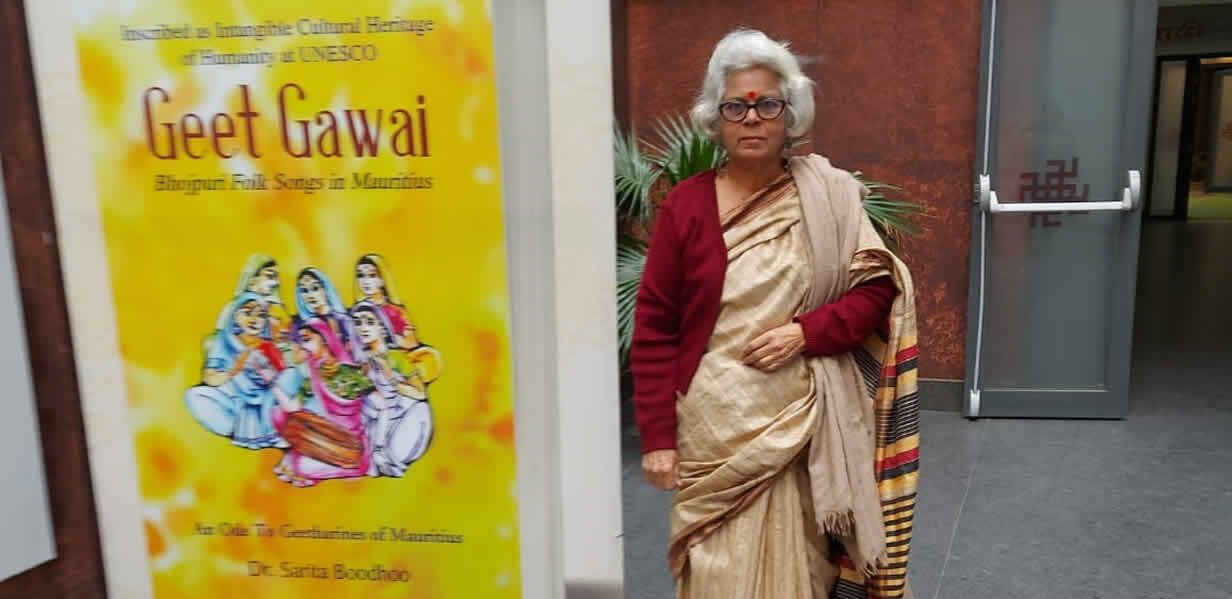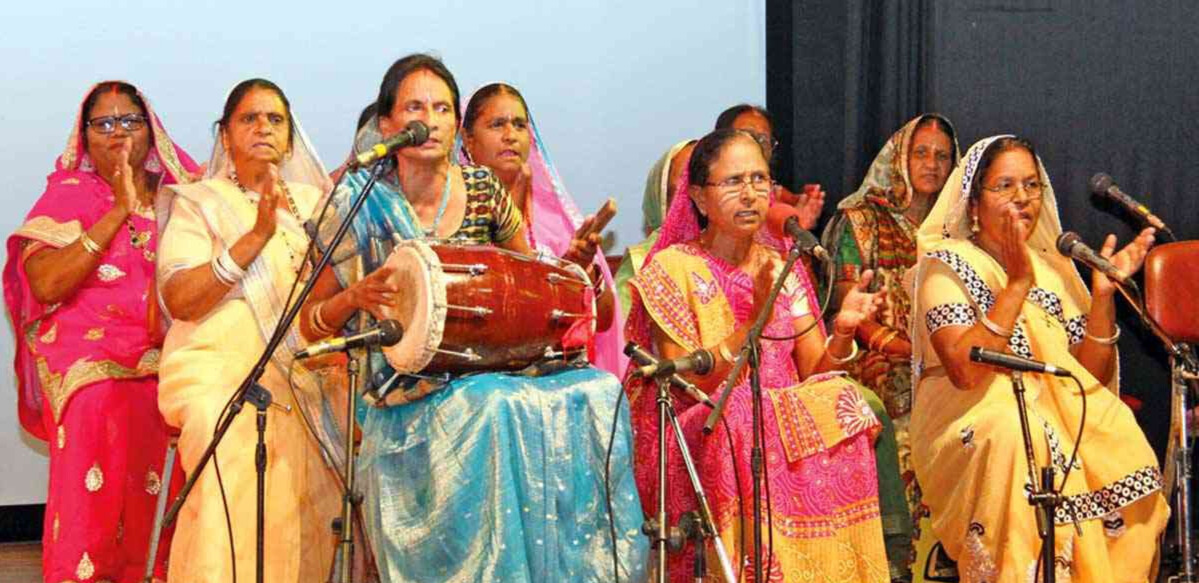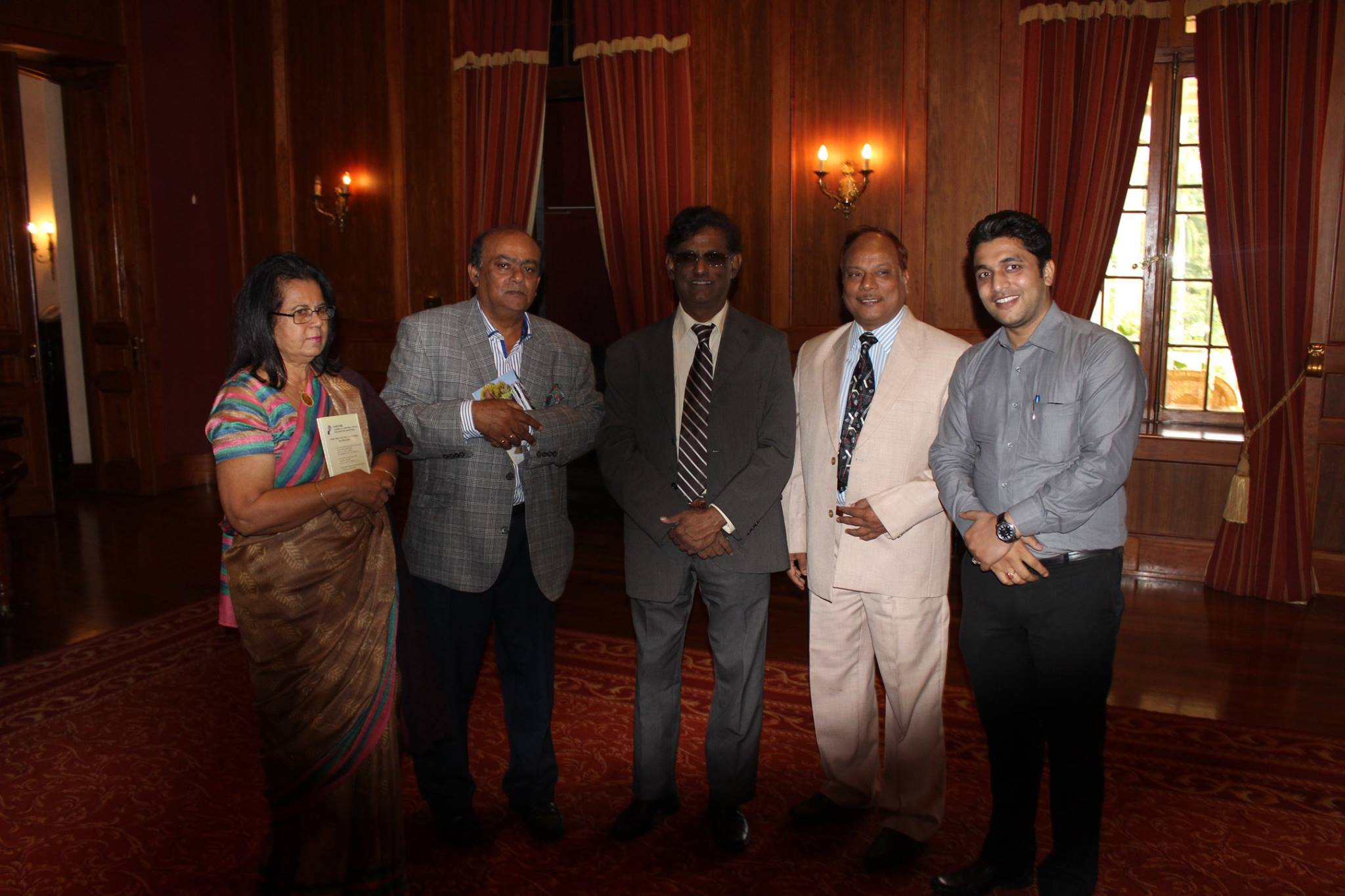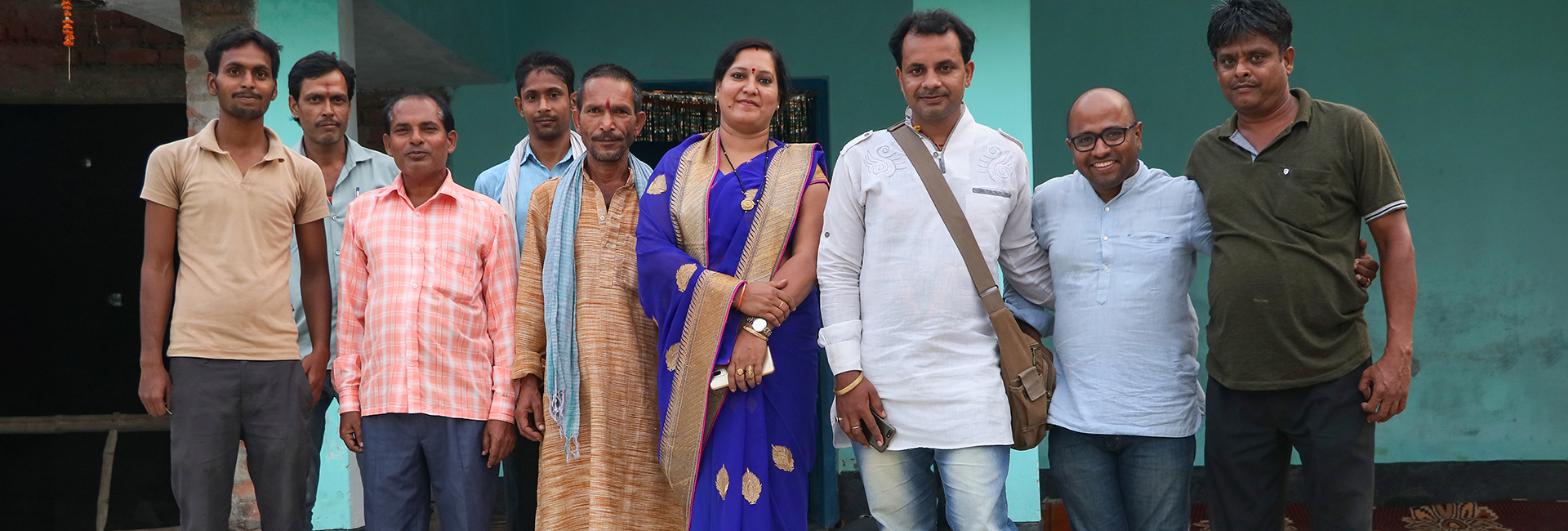(January 17, 2025) It’s a crisp January morning in Bhubaneswar, and the grand hall hosting the Pravasi Bharatiya Divas celebrations is alive with anticipation. Dr. Sarita Boodhoo, draped in a saree that reflects her rich heritage, steps forward to receive the Pravasi Bharatiya Samman 2025 from President Droupadi Murmu. Dr. Boodhoo has dedicated her life to breathing new life into Bhojpuri culture—from preserving its folk traditions to securing UNESCO recognition for “Geet Gawai.” Her work goes beyond preserving the past; it inspires a new generation to embrace their cultural roots with pride.
“Language is our identity. It is through language that you express your inner feelings and emotions. If you don’t know your mother tongue, you can’t express the inner soul.” the Global Indian once said. As the applause filled the grand hall, it wasn’t just for Dr. Sarita Boodhoo’s achievements but for the cultural legacy she has passionately kept alive over the years.

Dr Sarita Boodhoo
A Relentless Advocate for Bhojpuri Heritage
In Mauritius, a tiny island in the Indian Ocean, Bhojpuri songs fill the air—a tradition Dr. Sarita Boodhoo has fiercely protected. “We are proud of our ancestry, our ancient Indian culture and heritage.”
Dr. Boodhoo’s efforts brought Bhojpuri back into the spotlight with cultural weeks and festivals, but her proudest moment came when UNESCO recognised “Geet Gawai,” a pre-wedding ceremony that combines rituals, prayer, songs, music and dance.
Dr. Boodhoo’s mission finds its roots in the Indian diaspora’s arrival to Mauritius in 1834. Over generations, Bhojpuri became more than a language; it became a bridge to home. “We have 200 years of history in Mauritius and we have songs called sanskaar geet, the songs that women of India brought to the shores of Mauritius and preserved it over the years.”
A Scholar, a Dreamer, a Doer
Born and raised in Mauritius, Sarita’s upbringing was steeped in Vedic traditions that ignited her lifelong passion for culture. While her roots remained firmly in the island nation, her academic pursuits took her across the globe. She began her journey in India, studying Geography at Lady Brabourne College in Calcutta, and then moved to Banaras Hindu University for her Master’s and Ph.D. in Hindi. Her thirst for knowledge didn’t stop there; she later ventured to Germany and France, where she earned a diploma in Advanced Journalism, broadening her perspective and understanding of cultural narratives.
Leadership Rooted in Community
Back in Mauritius, she set up the Bhojpuri Institute in 1982, determined to keep her heritage alive. “I had set up the Mauritius Bhojpuri Institute to promote and propagate Bhojpuri as a living, pulsating language with its lores, verbal art, proverbs, metaphors, folk songs, and kahani kissas,” she recalls. From hosting song workshops to publishing Bhojpuri literature, her work became a rallying point for the community.
Efforts to pass Bhojpuri culture to younger generations have been strengthened through targeted initiatives. Hobby and certificate courses at the Rabindranath Tagore Institute encourage youth to explore Bhojpuri folk singing and songwriting in the face of rapid modern changes. Additionally, the Ministry of Education has introduced Bhojpuri alongside Hindi in schools, supported by pedagogical resources prepared by the Mahatma Gandhi Institute’s Department of Bhojpuri, Folklore, and Tradition. She emphasises the importance of empowering the younger generation to embrace Bhojpuri culture, not just as a memory of the past but as an evolving tradition.
In 2012, her efforts took a new turn when she became Chairperson of the Bhojpuri Speaking Union, a government body under the Ministry of Arts and Cultural Heritage. Through this role, she not only institutionalized efforts to preserve Bhojpuri traditions but also pushed for their global recognition. Her books, including Kanya Dan and Geet Gawai: Bhojpuri Folk Songs in Mauritius, have become seminal works for anyone interested in the language and its cultural nuances.

The Girmitya Legacy
It started in 1834—a story of grit, hope, and survival. As slavery was abolished, the British looked east to India for labourers willing to cross the seas to Mauritius. The agreements, or “girmits,” promised work on sugarcane plantations for five years, but the reality was often far harsher. Nearly half a million Indians, mostly from Bihar and Uttar Pradesh, boarded overcrowded ships, leaving behind everything they knew for an unknown future.
“The Bhojpuri term Girmitia is a symbolic term. It reflects the resilience not only of the language and its associated intangible cultural heritage but the capacity of the immigrants themselves to forge a meaningful place in their adopted countries.”
The journey wasn’t just physical; it was deeply emotional. Leaving behind their villages, families, and everything familiar, these early migrants stepped into an unknown world where even the language was alien. Dr. Boodhoo often highlights the emotional toll of this journey, emphasizing the courage it took to start anew in such challenging circumstances. At the Aapravasi Ghat in Port Louis, the site where they first set foot on Mauritian soil, the air still feels heavy with their stories.
Life on the plantations was tough. The days were long, the work exhausting, and the conditions far from fair. But even in the harshest moments, the labourers found strength in their community. They sang Bhojpuri songs while they worked, celebrated Holi with joy, and held onto rituals that gave them comfort. These traditions didn’t just survive—they grew, becoming a vital part of what defines Mauritius today.

This transformation, from laborers to a thriving diaspora that now constitutes nearly 70 percent of Mauritius’ population, is a legacy Dr. Boodhoo works tirelessly to honour. Her mission is not just to remember but to ensure this heritage thrives in a modern world.
A Legacy That Echoes Through Generations
Dr. Sarita Boodhoo’s journey is a story of love—for her culture, her community, and the voices of her ancestors. Her work reminds us that preserving heritage is not about looking back but about moving forward with pride in where we come from.
As Mauritius celebrates this extraordinary woman, her work stands as a reminder of the enduring strength of cultural identity—a strength that connects generations across time and space. And as she steps off the stage, award in hand, one can’t help but feel that her journey, much like the Bhojpuri songs she’s devoted her life to, will echo far into the future.
- Follow Dr Sarita Boodhoo on LinkedIn
Read a similar story of Dharmatma Saran, the visionary behind desi beauty pageants.




Very informative article. Dr Boodhoo played important role to promote Bhojpuri and Hindi in diaspora specially in Mauritius. She is very much active in socio-cultural development of Bhojpuri language and culture as well as Hindi. I got a chance to meet her in Kathmandu some years ago, she was proactive .